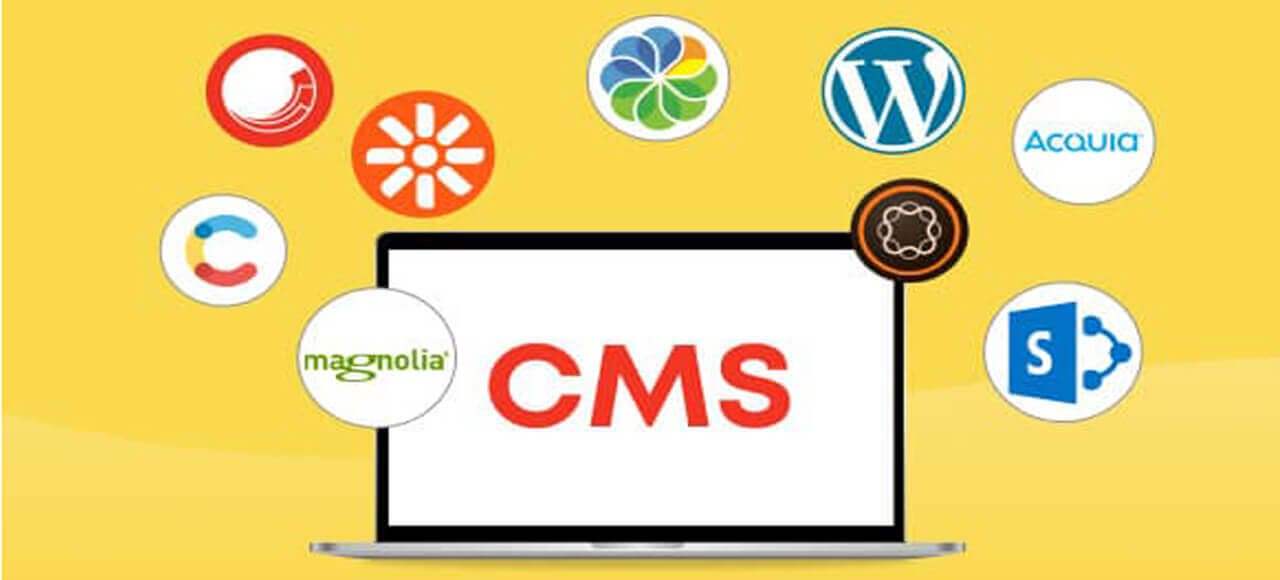There’s a lot of popular CMS platforms in the world right now. In this article you will know about 25 most popular CMS platforms to create your website.
A content management system (CMS) is a computer application that enables webmasters to manage the creation, organization, and presentation of web content.
A CMS can be used to create a single website from a set of modular components or to manage a network of websites.
Website design is the process of creating a digital or print medium that can be viewed by the general public. With a CMS you will be able to design a website easily.
Before creating your website you should read out which CMS is better for search ranking.
What is CMS (Content Management System)?
CMS stands for Content Management System. A CMS is a system that helps you manage and publish your website’s content. It allows you to easily create, edit, and manage your website’s content from one central location.
This can make your website more accessible and user-friendly. A CMS also allows you to customize your website’s appearance and content, making it more unique and reflective of your brand.
25 Most popular CMS platforms
Here is the list of best 25 popular CMS platforms;
1. WordPress
Market Share: 42%
Live websites: 30 Million Plus
WordPress which is obviously the most popular CMS platforms, enables you to create a website or blog from scratch, or to improve an existing website. WordPress is free and open source software released under the GPL.
WordPress was created in 2005 by Matt Mullenweg and David Karp and has since grown to be the most popular CMS on the web. WordPress is used by millions of people all over the world, including many large companies and organizations.
2. CMS Hub
HubSpot CMS Hub is a fully integrated and one of the most popular CMS platforms which is specifically designed for marketers and business owners.
It is built on top of HubSpot’s CRM platform. This includes all sorts of marketing automation, sales, service, as well as operations tools. This CMS is an ideal solution for growing businesses and large enterprises looking for an all-in-one system to manage their website.
3. Drupal
Drupal is an open source, highly flexible and popular CMS platform targeted to a wide pool of developers, agencies and marketers.
Drupal allows marketers with more basic experience to create a site from a template. It is very efficient for developers to create a site to handle large volumes of data and heavy traffic.
As Drupal was designed by developers for developers, you will need to have at last some basic knowledge of PHP, HTML, CSS etc. to take advantage of all it’s power. You may have to spend some time to set up and configure your site than you would on WordPress, for example.
4. Wix
Wix is a user-friendly and paid web development platform that makes creating a website easy. With Wix, you can create a website in minutes, without any prior coding experience.
Wix was created in 2006 by Michał Karczewski, who wanted to make web development more accessible to everyone. Today, Wix has over 500 million users worldwide, making it one of the most popular web development platforms on the market.
5. Blogger
If you are looking for a CMS that will help you to manage your blog, then you may want to consider using a blogger CMS. Blogger is a very popular CMS platforms for creating and managing blogs, and there are many different blogger CMSes available.
One of the benefits of using a blogger CMS is that it is easy to customize. You can add your own content, design your own blog, and manage your blog using a single platform.
6. Joomla
Joomla is also another popular CMS platforms which is free and open source. It has a lot of different templates and extensions. Only you need is a domain name and hosting to go.
As like as WordPress, it was first released in 2005. Joomla is also packed with features, and many web hosts offer a 1 click installation for this popular content management system.
However, it’s really an ideal CMS platform for developers as well as experienced website creators although it is not such a good option for beginners.
7. Weebly
Weebly is a web-based platform for creating a website or blog. It is easy to use, with drag-and-drop features and a user-friendly interface. Weebly also offers a wide range of features, such as blog hosting, domain registration, and e-commerce.
8. Shopify
Shopify is a ecommerce platform that allows businesses to create and manage their own online stores. It offers a wide range of features, including an easy-to-use checkout process, custom designs, and automated shipping.
Shopify also offers a range of add-ons, such as payment processing and marketing tools. In addition, Shopify offers a free trial so businesses can test out the platform before making a full investment.
9. WooCommerce
WooCommerce is a popular eCommerce platform that allows users to create custom websites and online stores. WooCommerce is a free and open source platform that can be used on a wide range of devices, including desktop and mobile devices.
WooCommerce is a versatile platform that allows users to create and manage their own online stores. WooCommerce is free and open source, and can be used on a wide range of devices, including desktop and mobile devices.
10. Magento
Magento is a popular eCommerce platform that is used by thousands of businesses around the world. Magento is a powerful platform that can be used to create a wide range of online stores.
Magento is an easy platform to use and can be customized to create a unique online store. Magento is a powerful platform that can be used to create a wide range of online stores. Magento can be used to create an online store that is focused on the sale of products.
11. BigCommerce
If you’re looking to build a custom content management system (CMS) for your business, then you may want to consider BigCommerce.
This platform offers a number of features that can help you manage your content, including a custom editor, automatic content updates, and more.
Plus, it’s easy to use, so you can get started quickly. If you’re interested in learning more about BigCommerce, be sure to check out our blog section.
12. Magnolia
Magnolia is also a popular CMS platforms that helps you to create and manage your website content. It is free and open source software released under the GNU General Public License.
Magnolia has a number of features that make it an ideal choice for small to medium-sized businesses. Magnolia is easy to use and has a modular structure that makes it easy to add new features and modify existing ones.
Magnolia is also well documented, which makes it easy to find answers to questions.
13. Optimizely
Optimizely is a platform that allows users to optimize websites. It is often used to optimize websites for search engines and to improve user experience. Optimizely is available as a paid service or a subscription-based platform.
Optimizely is best for its A/B testing features. It has been steadily expanding their tools for marketers.
Optimizely allows editors to create and share visually appealing content as well as provides developers with a means to quickly create and launch new pages and sites.
14. Progress Sitefinity
Progress Sitefinity CMS is a content management system (CMS) that provides a flexible platform for creating, managing, and publishing content online.
Progress has a wide range of features to help you organize and publish your content, including a versatile layout system, a powerful blogging platform, and a wide range of integrations.
Progress Sitefinity CMS is well suited for any type of website, from small businesses to large organizations. Its flexible platform allows you to create a custom layout and design.
15. PrestaShop
PrestaShop is a popular ecommerce platform that enables you to create a custom online store. It’s easy to use, has a range of features, and is free to use.
PrestaShop is perfect for small businesses and entrepreneurs who want to create a custom online store without spending a lot of money. It has a range of features, including product pages, checkout, product descriptions, and more.
16. Ghost
Ghost is a popular CMS platforms that is built on the Symfony2 framework. It was created by Daniel Kehoe and is released under the GPL license.
Ghost is a very versatile system that can be used to manage any type of website. It has a very easy to use interface and is very fast. It also has a lot of features, such as custom themes and CSS styles, that allow you to create a unique look for your website.
17. TYPO3
TYPO3 is a free and open source content management system (CMS) that enables you to create a website or blog from scratch, or to improve an existing website.
TYPO3 is versatile, efficient, and easy to use, making it a great choice for small businesses and individual users.
TYPO3 is a popular CMS for a reason. It’s easy to learn and use, and it has a wide range of features to help you create a website or blog.
18. Crownpeak
Crownpeak CMS is a content management system that helps you create and manage your website content. It has a user-friendly interface and is compatible with a wide range of web browsers.
Crownpeak CMS also has a powerful built-in editor that allows you to create rich content pages quickly and easily.
19. Textpattern
Textpattern is a content management system (CMS) that allows users to create and manage their websites and blogs quickly and easily.
Textpattern is built on the popular Ruby on Rails platform and is perfect for any business that needs to create a website or blog quickly, with a minimal amount of fuss.
Textpattern is incredibly easy to use and features a range of features to help you manage your website and blog. You can easily create, manage and publish content, create custom layouts and designs.
20. Contentful
Contentful is a content management system that makes it easy for you to create and manage your website’s content.
With Contentful, you can easily create and manage your website’s content, create custom content types, and manage your site’s content across channels.
You can also easily share your site’s content with others, and use Contentful’s content management features to manage your site’s content across devices.
21. Storyblok
Storyblok is a content management system (CMS) that enables users to create and manage their own websites and blogs using a drag-and-drop interface.
Storyblok is free and open source, and it has a wide range of features that makes it a popular choice for online content creators.
One of the main benefits of using Storyblok is that it is very easy to get started. You can create a new website or blog in just a few minutes by using the default options.
22. Bitrix24
Bitrix24 is a versatile and powerful content management system that can be used to manage any type of website. It is a great option for small businesses and organizations that need a simple system that is easy to use.
Bitrix24 also has a number of features that make it an ideal platform for online marketing and content management.
23. concrete5
Concrete5 is an open source content management system (CMS) created to help teams manage and publish content online. It offers a drag-and-drop interface and a wide range of features to make content creation and management easy.
One of the most popular features of Concrete5 is its built-in blog engine.
This allows you to easily create and manage your blog posts, add images and videos, and track your readership statistics. Plus, you can easily create custom templates to make creating your blog posts easy.
24. Contentstack
Contentstack can also be said as a popular CMS platforms that helps organizations manage and publish content online. It features a modular architecture that makes it easy to add new features and expand the functionality of the system.
Contentstack also offers a variety of tools and features to help you manage your content, including a content editor, content management system, and content syndication tools.
25. Webflow
Webflow is a user-friendly and modular content management system (CMS). It enables you to create beautiful, interactive websites from scratch, or to improve and personalize existing ones.
Webflow is versatile, easy to use, and comes with a wide range of features, including:
-Customizable navigation
-Flexible content types
-User profiles
-Cloud storage for files and content
-A wide range of plugins and themes
Webflow is free to use, and you can find more information and get started on the Webflow website.
I think you have got a good idea about which CMS is better fit for you. Don’t forget to tell your opinion about which of these popular CMS platforms is best fit for you.
Recommended articles:
Which CMS is better for search rankings? Does CMS matter for search rankings?
Types of digital marketing, 13 best tips and tricks for beginners
13 things to do before switching WordPress theme
Best 100 plus online business ideas for you
What is SEO? How does SEO Works? Details of SEO
150 plus best affiliate programs which pay high commissions and free to join




Hey superb blog! Does running a blog similar to this take a massive amount work?
I’ve absolutely no knowledge of programming but I had
been hoping to start my own blog soon. Anyhow, should you have
any ideas or techniques for new blog owners please share.
I understand this is off subject but I simply wanted to ask.
Many thanks!